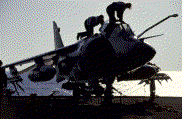Operation Deliberate Force
At 2am (local time) on 30th August, NATO launched its biggest military operation to date. The operation was launched in response to the mortaring of Sarajevo's Markale marketplace on the morning of 28th August.
With the UN Commander in Chief, General Janvier of France, the air strike key for the UN was in the hands of General Rupert Smith. At 5:30pm Smith received the first crater analysis report from the UN crater analysis team that confirmed that the mortars had been fired from Serb territory. Smith spoke to Admiral Leigh Smith, the holder of NATO's air strike key, who was in Naples.
Admiral Smith thought that artillery fire from the deployed Rapid Reaction Force units would be inadequate and told General Smith that his key was already turned. When General Smith heard that the last British unit had left Gorazde at 10:30pm local time, he turned the UN air strike key. The Serbs denied their mortars had struck the marketplace and Janvier returned from France to find the key had been turned.
The first day saw over sixty planes attacking Bosnian Serb positions around Sarajevo; the first attacks were hampered by fog but targets included air defences, munitions factories, ammunition depots and storage depots. The Rapid Reaction Force's artillery on Mount Igman fired about six hundred rounds against Bosnian Serb artillery, mortar, and air defences around Sarajevo.
Janvier informed the Bosnian Serb General, Mladic to withdraw all heavy weapons from the 12-mile exclusion zone around Sarajevo, end all attacks on all safe areas and end hostilities throughout Bosnia or the attacks would continue. Bad weather on 31st August stopped air attacks and the Russian ambassador demanded an end to NATO air strikes. Janvier met with Mladic but Mladic cancelled the meeting when Janvier was en route, as air strikes had been suspended on that day, 1st September at 5am, to allow the meeting to take place. Mladic changed his mind later that day.

After a 13-hour meeting, Mladic promised not to attack the safe areas and withdraw his heavy weapons but made other conditions not acceptable to NATO. Janvier repeated his demands for Serb withdrawal once more in writing and set a deadline of 11pm on 4th September. Mladic wrote back in response to Janvier and Rupert Smith's letters rejecting the UN/NATO demands.
Ninety NATO aircraft attacked a military storage facility on 5th September, resuming the bombardment. Attacks continued into 6th September and the Rapid Reaction Force was constantly firing on Serb artillery and mortar positions around Sarajevo. Weather again forced missions to be aborted on 6th September.
On 10th September, Janvier met with Mladic again in Belgrade. Mladic demanded an end to the bombing, and Janvier repeated that the bombing would not stop until the conditions laid down on 4h September were met. Russia complained again about the bombing.
On 14th September, the Bosnian Serbs agreed to the conditions and the bombing ended. Serb heavy weapons were withdrawn from the Sarajevo exclusion zone and the siege of the city was lifted.
The bombing was partially successful, some targets being attacked repeatedly to maintain the offensive, but the aggressive employment of artillery by the Rapid Reaction Force and the Croat offensive through Krajina had all pressured the Bosnian Serbs into compliance.



